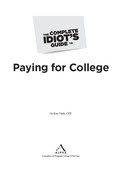Cutting Costs on Books
Saving money on books can be absolutely hit-and-miss, depending on which classes your student is taking, which textbook and edition an instructor is requiring, and whether other students have recently taken that class. But, when it is a hit instead of a miss, it’s a homerun. Don’t get discouraged if you end up paying full price for books for one or more semesters. Keep looking for savings opportunities because they will come along. Every semester, follow these tips, and savings should eventually materialize:
• Get your class schedule as early as possible—By registering early and getting your schedule as soon as possible, you’ll be able to start searching for used books before everyone else. The early bird gets the worm!
• Advertise your need—Once you know which classes you’re taking, which will usually be before the bookstore even opens for the semester, you can begin putting out feelers for secondhand books. Post some flyers on the school bulletin boards announcing the books you’re looking for and the price you’re willing to pay. Do the same on your school’s online message boards. Chances are that you’ll find a used book for even cheaper than what the school’s bookstore has to offer.
• Go online—Check eBay, Amazon.com, and other online marketplaces for copies of your book. Heck, with an online auction, you might even get the books you need for as little as $10 to $20 each, plus shipping.
• Consider renting—As hard as it is for some of us old fogies to imagine, you can actually rent textbooks nowadays. Websites like Chegg.com, CampusBookRentals.com, and BookRenter.com all rent textbooks at about one-third the cost of buying them new. If you do a little searching on the Internet, you can find some coupon codes to get them even cheaper.
• Consider sharing—If you and your roommate or a friend are taking the same classes, especially ones that require you to purchase multiple books, consider splitting the cost on just one copy and sharing. Voila, your textbook costs have been cut in half!
• Be first in line—If you haven’t been able to find a book through one of these other methods, be sure you’re near the front of the line when your campus bookstore opens for the semester. Most campuses stock a limited supply of used books, and they go like hotcakes.
• Be first in line, again—When it comes time to sell your books back to your campus bookstore, you’ll want to be first in line again because your bookstore will only likely buy back a portion of what it originally sold. If the store tries to lowball you on your book’s value, consider posting some flyers around campus and trying to sell it directly to another student.
Don’t avoid buying a cheap, older version of a textbook just because the class demands a newer edition. Often, the changes in these textbooks are minimal, with 100 percent of the crucial information staying the same. To find out how much a textbook has changed and whether an older version will do the trick, visit the publisher’s website and look for the revision notes for the newer book.
The Least You Need to Know
• Write a formal letter asking your school for an additional discount due to financial hardship, every year that you attend.
• Use community college, intensive courses, CLEP tests, and advanced placement classes to get some general education requirements out of the way.
• Lower your room and board costs by moving off-campus, avoiding high-priced or unused meal plans, taking on an extra roommate, or even becoming a residential advisor (RA).
• Only buy your textbooks from the campus bookstore as a last resort.
..................Content has been hidden....................
You can't read the all page of ebook, please click here login for view all page.
